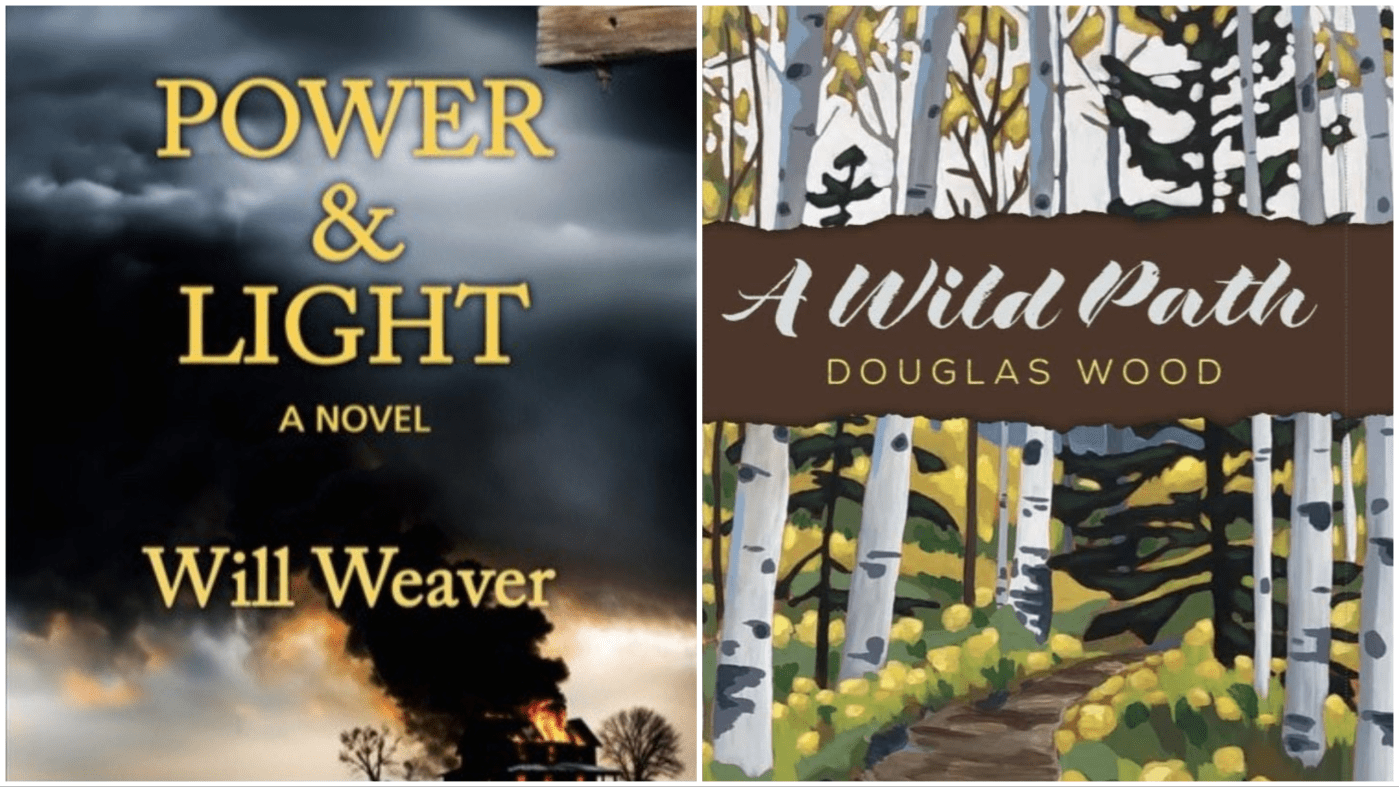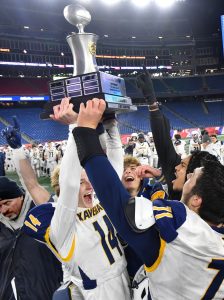
Readers and writers: A trip ‘Up North’ for two great books
New books from two Minnesota Book Award-winning authors who live “Up North” are our treat today. Will Weaver, who calls Bemidji home, offers historical fiction with a Norwegian vibe and Douglas Wood, who lives near Sartell, tells in essays of his journey from skinny kid who suffered from ADHD to popular writer and outdoorsman. Both are published by Minnesota presses.
“Power and Light”: by Will Weaver (Calumet Editions, $21.99)
(Courtesy of Will Weaver.)
“Those Haugens are crazy,” Dolly said. ‘”When they finally got power and light, what do they do? They nearly burn down their farm. Then the REA lineman got killed trying to help them rewire, plus one of the younger girls got her arm caught in a wringer washer and broke it. How stupid can you get? And the older brother, he was the one who made Robert the pair of boots that…” — from “Power & Light”
The title of Will Weaver’s ninth book, “Power & Light,” can be taken literally or as metaphor. The literal story is the coming of electricity to rural North Dakota. Metaphorically it’s about the power and determination of four sisters who bring light to their farm over the objections of their older brother and fight for a lost daughter/niece.
A brief opening chapter is set in 1906 in Vestland, Norway, where tenant farmers Karl and Petra Haugen are treated more like slaves by the rich landowner and his wife, who mocks, smacks and humiliates Karl. With no future in sight in Norway, the couple escapes in the middle of the night with 4-year-old Emil and baby Dag.
The next chapter jumps to 1933 in Skye, N.D., where the family has grown to include Sally and tough 17-year-old Jenny. Right away we know we are not in “Little House on the Prairie” as Sally is molested by the beloved town doctor while she is under anesthetic. Everything that happens after this is the heart of the novel. When Sally learns she is pregnant, her brother Emil is outraged. She’s confused herself, since she never even had a boyfriend. Finally, the truth comes out and Emil has his revenge on the doctor involving a clever use of his shoemaking skills. But what to do with Sally’s baby?
Emil takes the child from his sister right after her birth at the farm and leaves her in a basket on a train behind where the Rossi family is seated. He leaves a note saying “Baby needs a home” in English and Norwegian and slips away.
Underlying the narrative is the family’s identity as Norwegian Americans still close to the old country even though Petra and Karl are dead. Sally, who becomes fragile and otherworldly after her baby is taken away, sees trolls and little people in the rocks based on stories her mother told. Some phrases are in Norwegian, and religious differences come into play when we meet Helen Rossi, a Lutheran who left the church to marry Catholic haberdasher Arno. They adopt Sally’s baby after finding Emil’s note and name her Rosalie.
Much of the story is driven by Jenny, the youngest sister and the most determined, whether she’s trying to get power and light to the farm or find Sally’s daughter. She locates Rosalie and the last dramatic chapters put readers in the courtroom as the doctor goes on trial for fathering Sally’s child. As the legal proceedings drag on, the Haugens are mostly shunned by the townfolk, who side with the doctor, aided by his nefarious wife who will do anything to protect her husband.
Threading through the story is the hard work these farm women did without benefit of electricity and what getting power meant to their daily lives. No more carrying water for the laundry, stirring the wet clothes with a stick, wringing heavy men’s farm clothes by hand. As one employee of the government agency overseeing power installations observed, the first thing women wanted when electricity came was a washing machine.
Weaver’s previous books include Minnesota Book Award-winning “Red Earth, White Earth” and “Gravestone Made of Wheat,” a story collection that inspired a 2006 film, as well as “Sweet Land: New & Selected Stories,” also the basis for a film. His young adult novel “Defect” won a 2008 Minnesota Book Award.
In a personal note to the Pioneer Press, Weaver said “Power & Light” was five years in the writing and is the first of a two-book saga of the Midwest that follows the immigrant family’s story into the present. Weaver says he has connections to Norway since his grandfather came from there and his son is married to a Norwegian woman and they live in Norway.
Although Weaver’s previous books have been mostly published by Simon & Schuster and HarperCollins, this one is from Minnesota-based Calumet Editions. “This seemed like a story best edited and produced by an all-Minnesota team,” he writes, “people who ‘get it’ when I’m writing about the Scandinavian influence on our Midwest.”
“A Wild Path”: by Douglas Wood (University of Minnesota Press, $24.95)
(Courtesy of the author)
Walking on the frozen river, following my own tracks back to their source on the riverbank, near the old cabin under the pines, I continued to think about the world of 20 centuries ago. That world of Shepherds and flocks living under the same stars I gazed at now. The world of an infant in a cattle stall, and later of a Teacher carrying his shepherd’s crook and guiding his flock, a Teacher whose words and thoughts are honored yet today. It is all one world, I thought, one universe, one realm of light and darkness, mystery and beauty, bound together by the world within — what the Teacher called the Kingdom of Heaven within. — from “A Wild Path”
These are the ponderings of Douglas Wood as he snowshoed in 30-degrees-below-zero in an essay titled “A Christmas Walk.” It’s one of 32 pieces in his new collection “A Wild Path,” a follow-up to his popular book “Deep Woods, Wild Waters.” Some of his other 39 titles are “Paddle Whispers” and “Fawn Island” for adults, and for children “Grandad’s Prayers of the Earth” and “Old Turtle,” his 1992 debut book about a wise old creature that won a Minnesota Book Award and led to several more books in the series. It also stopped being a children’s book when it was embraced by people of all ages.
Wood is active on social media, where he often writes about the Church O’ the Pines, the “congregation” made up of the birds and wildlife around the old cabin where he lives with his wife, Kathy, and where they raised two sons. Everybody gets along pretty well in Fellowship Hall, and there is much chatting, tweeting, and feasting among the pines. His occasional poems about Great MuckyMuck (you know who that is) written in a Dr. Seuss-ish style was so popular with Facebook readers that he published them in a book, “Tale of the Great MuckyMuck.”
In the new book Wood, an artist, a musician, an educator and a wilderness guide, delves more deeply into his personal history. He was a skinny, friendless kid who was his school’s worst reader because of ADHD and dyslexia, not diagnosed until his adulthood. He found his solace in nature, something he now calls Wilderness Therapy.
Wood writes of how Sparky the Cardinal became his companion after he rescued the little guy from a shrike. He recalls how he and Kathy finally fulfilled their dream of owning a cabin in the woods, and how his outdoor and literary mentor Sigurd Olson changed his life after he read Olson’s book “Listening Point.” He discusses grouse hunting with nothing but a rock, and how an old sock is the most important implement in making a wilderness camp.
This is not a “this is what happened to me” essay collection, although it is written in the first person. It’s a meditation on our relationship to nature, especially as so many of us live now in cities and developed suburbs, and how and why we need outdoor experiences like camping and watching beautiful sunsets. He sees something eternal in the environment and in humans.
Wood will host a free launch party and concert at 2:30 p.m. Sunday, Dec. 10, at Pilgrim House Unitarian Universalist Fellowship, 1212 Highway 96, Arden Hills, joined by musician Steve Bergstrom, a member of Wood’s WildSpirit band.
Related Articles
How a book publishing ‘mistake’ reignited the U.K.’s royal racism furor
Readers and writers: How Barbara Kingsolver’s daughter got her to team up to write first children’s book
Literary calendar for weeks of Nov. 19 and Nov. 26
Readers and writers: Check out 4 new books featuring local history
St. Paul library book checked out more than 100 years ago finally returned


